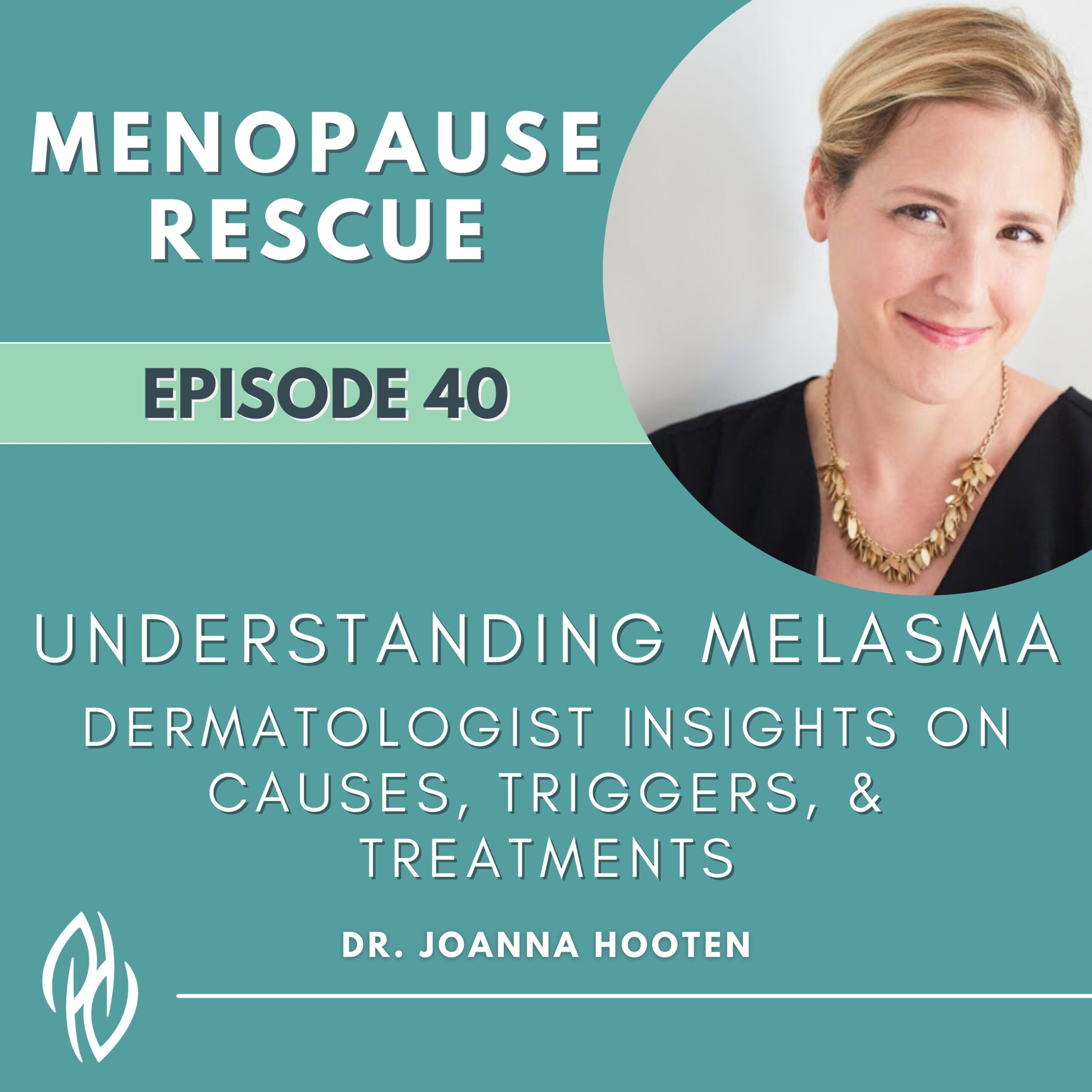Understanding Melasma: Dermatologist Insights on Causes, Triggers, and Treatments
Unpack the multifaceted causes and triggers of melasma
Understanding Melasma: Dermatologist Insights on Causes, Triggers, and Treatments
Unpack the multifaceted causes and triggers of melasma
Melasma is one of the most common—and frustrating—skin conditions many women face. In this episode of our podcast, Dr. Polly Watson sits down with dermatologist Dr. Joanna Hooten of Clara Dermatology to dive deep into what causes melasma, why it often appears during pregnancy, perimenopause, or hormone replacement therapy, and most importantly, what you can do about it.
“The single most important factor for people who have melasma is sun protection.“
Dr. Hooten explains how sun exposure, hormonal changes, heat, and even genetics can trigger melasma, creating the characteristic “muddy brown” patches on the face. Together, she and Dr. Watson break down practical strategies for prevention, including broad-spectrum sunscreen, vitamin C serums, antioxidant support, and protective clothing. Listeners will also learn about the latest treatment options—from compounded hydroquinone creams and botanical brighteners to innovative approaches like oral tranexamic acid, micro needling, and platelet-rich plasma therapy. The conversation is packed with realistic guidance on what works, what doesn’t, and how to set expectations for long-term skin health.
Watch The Conversation!
Key Takeaways:
- Melasma is often triggered by sun exposure, hormones, heat, and even genetics.
- The most powerful prevention tool is daily broad-spectrum sun protection with antioxidants.
- Setting realistic expectations is key—melasma can be managed, but not permanently cured.
Melasma is one of the most common—and frustrating—skin conditions many women face. In this episode of our podcast, Dr. Polly Watson sits down with dermatologist Dr. Joanna Hooten of Clara Dermatology to dive deep into what causes melasma, why it often appears during pregnancy, perimenopause, or hormone replacement therapy, and most importantly, what you can do about it.
“The single most important factor for people who have melasma is sun protection.“
Dr. Hooten explains how sun exposure, hormonal changes, heat, and even genetics can trigger melasma, creating the characteristic “muddy brown” patches on the face. Together, she and Dr. Watson break down practical strategies for prevention, including broad-spectrum sunscreen, vitamin C serums, antioxidant support, and protective clothing. Listeners will also learn about the latest treatment options—from compounded hydroquinone creams and botanical brighteners to innovative approaches like oral tranexamic acid, micro needling, and platelet-rich plasma therapy. The conversation is packed with realistic guidance on what works, what doesn’t, and how to set expectations for long-term skin health.
If you’ve struggled with melasma or worry about skin discoloration with hormone therapy, this episode offers hope and actionable tools. Tune in today to hear Dr. Watson and Dr. Hooten share expert insights that can help you feel confident in your skin.
Quotes:
- “The single most important factor for people who have melasma, and I like to say for everybody, because we all have skin and live on the earth, is sun protection.” – Dr. Joanna Hooten
- “It’s important to be aware of potential triggers like heat from hot yoga or saunas, which can affect melasma.” – Dr. Joanna Hooten
- “Hormonal fluctuations, such as those from hormone replacement therapy or birth control, can really turn on a light switch for melasma.” – Dr. Joanna Hooten
Resources: https://hormonewellnessmd.com/podcast-resources
Disclaimer: https://hormonewellnessmd.com/podcast#Disclaimer
Meet the host!
Dr. Polly Watson is a board certified OBGYN who has additional training in menopausal medicine, sexual medicine and functional medicine.
She looks forward to sharing her knowledge with you to help find a solution to address the imbalance in your system and restore your health.
In 2019 I left my job as an employed physician with a large organization and started Hormone Wellness MD. I started with no staff working out of a single room. Since then, my staff has grown to a team of 5 and we’ve helped over 1,100 people on their health journey.

Meet the Guest Speaker!
Dr. Joanna Hooten is a board-certified dermatologist and co-founder of CLARA Dermatology in Cary, North Carolina. She specializes in medical, surgical, and cosmetic dermatology, with a focus on evidence-based treatments that deliver natural, healthy results. Known for her approachable style and patient-first philosophy, Dr. Hooten combines deep medical expertise with a passion for helping patients feel confident in their skin. She frequently speaks on skin health, anti-aging, and conditions like melasma, sharing practical, science-backed advice people can use in their daily lives.
I use a holistic approach to helping people achieve their best skin.

Meet the host!

Dr. Polly Watson is a board certified OBGYN who has additional training in menopausal medicine, sexual medicine and functional medicine.
She looks forward to sharing her knowledge with you to help find a solution to address the imbalance in your system and restore your health.
In 2019 I left my job as an employed physician with a large organization and started Hormone Wellness MD. I started with no staff working out of a single room. Since then, my staff has grown to a team of 5 and we’ve helped over 1,100 people on their health journey.
Meet the Guest!

Dr. Joanna Hooten is a board-certified dermatologist and co-founder of CLARA Dermatology in Cary, North Carolina. She specializes in medical, surgical, and cosmetic dermatology, with a focus on evidence-based treatments that deliver natural, healthy results. Known for her approachable style and patient-first philosophy, Dr. Hooten combines deep medical expertise with a passion for helping patients feel confident in their skin. She frequently speaks on skin health, anti-aging, and conditions like melasma, sharing practical, science-backed advice people can use in their daily lives.
I use a holistic approach to helping people achieve their best skin.





